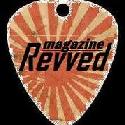(click on picture to open file)
By: Michael D. Vogel
© July 11, 2000. Michael D. Vogel. All Rights Reserved.
Published in:
Aggro-Active magazine – August 4, 2000
As the 21-century unfolds; it’s becoming more and more obvious that we have moved into a ‘cyber’ world. After all, even the most socially awkward individuals among us can now reach out and touch millions of people from around the world with the same relative ease as when the pick up a telephone. In the world of radio, a Program Director now has the opportunity to put his station on the ‘net with the hopes that millions from around the world will discover their station.
While few are lucky enough to hit the jackpot, Glen Gardner and the staff of WJJO Madison, WI. are one of the lucky ones who have struck pay dirt by successfully melding style, attitude and a touch of danger into a regional ‘terrestrial’ Rock station and turned it into a worldwide super-station. And the rest as they say, is cyber-history. Glen and his staff have elevated their station to #1 rated Rock station in their Arbitron market and a Top 25 ranking for time spent streaming. Not bad for a station less than 3 years old.
Glen is one of those rare behind-the-boards talents who will take on any project for the sheer thrill of a new adventure as well as a character building experience. A native of Worcester, MA, Gardner has seen the ups and downs of the radio biz as well as exploring all it varied formats, even trying his hand at reporting for United Press International. But when it comes right down to it, this gardener is a true Rock & Roll rebel. I was able to pin the Glen down for a few minutes to expound on how he makes his garden grow.
What types of programming philosophy have you come up with that has helped to yield your success track record with Arbitron?
Glen Gardner: “It’s a pretty basic philosophy. Hire excellent people, let them be creative in doing their jobs, and then get out of the way. How many times have we all worked in places where its ‘here’s the plan, execute it, see you later and don’t deviate.’
“At ‘JJO, we have given people a tremendous amount of freedom, but with that comes a tremendous amount of responsibility as well. You live by the sword, you die by the sword, which is why you have to not only hire great people, but you must get the absolute best.”
What do you see are some of the major issues facing Active Rock Radio?
GG: “I think one of the issues facing Rock Radio in general, and I learned it from my time at ‘AAF-and it’s a lesson I’ve carried with me ever since, is the danger level. What made radio so appealing was the danger level for the listener. Once the format gets to soft and too predictable, it’s not rock anymore. It has become something else. Rock by its nature has to be dangerous. Your parents probably aren’t going to like it and there might be some warning stickers on the albums and some naughty words might make it onto the radio every once in a while…so what! Those that can’t handle it should probably find a safer line of work, because by nature, I don’t think you can have a successful rock station without it being somewhat dangerous. It’s just the nature of the beast. The unpredictability is what makes the format so viable. When it becomes too predictable and safe, that it gets stale and tepid and ultimately attracts the wrong listeners. If the reaction isn’t along the lines of ‘we should get this child to a psychiatrist and have his head examined’, then there’s something wrong. That is what Rock Radio should be. If you parents understand it, you’re probably not doing your job.
“The other thing I carry with me from those ‘AAF days was the element of unpredictability. You never really know what you’re going to hear on the station. Dave Mustaine could drop by or maybe call in-it’s a unique relationship that we have with our artists; our studio’s and phones lines are always available to them. I think that was one of the neat things about what was called back then Progressive Rock Radio. All kinds of incredible things would happen, nothing was scripted or spit out from a computer. It’s that unpredictable nature of, if Zakk Wylde is in town, we’re going to haul his ass in here, give him a guitar and say ‘Why don’t you play a couple of songs for us and lets take a few calls from the listeners. I think that is good radio”
As Active Rock Radio embraces more harder edged bands, those with controversial and sometimes violent lyrics, what type of responsibility does the format have towards its listeners?
“I think we’ve got a responsibility to entertain. First and foremost, we are an entertainment medium. If the public is asking for a particular kind of entertainment, I don’t want to be the censor that decides that it is not responsible to have that on the radio station. Anything can be construed in a hundred different ways. For example, Randy Newman’s ‘Short People’ offended a lot of people. Sure it was a controversial song at the time, but it had nothing to do with short people but more about people’s prejudices. Things are not always as they appear. We as an industry should not be making decisions as to what kind of art is out there on the basis of what the content is. Yet, musically, we make those decisions all the time, whether we think a song is going to work out and whether it fits the format or not. I’m just not comfortable being someone else’s parent and I don’t think I should have to be. If a parent doesn’t like what we put on the radio, I’d encourage them to sit down with their kids and either talk about it or simply encourage them not to listen to it.”
What type of impact has the Internet had on ‘JJO and how has it affected the way you program the station?
“I think it has had a tremendous impact and we’re only now just starting to crack the surface. The growth we have seen has been extraordinary. We have some really good software on our web site that allows us to chart exactly what our growth pattern is. And, it updates us on a daily basis on how they’re using it, what browser they’re using, where they are coming from and where they are going, as well as what they are looking at on the site.
“For example, in January of 1998 we had a total 10,000 hits in that month as compared to 2.7 million hits in June of 2000 with more than 104,000 unique visits. The first time we hit a million was April of ’99. We hit 2 million this past January and now we’re nosing up towards 3 million.
“The growth rate has been incredible. So the impact the web has had first off is that it has opened up the radio station to the world. There maybe some formats that lend themselves to streaming much better than other formats-in fact, I think it is the niche formats in particular that would succeed because these formats are not available in a lot of different places. What town doesn’t have a station that plays Barbara Streisand or Neil Diamond? So how relevant would it be to stream an Adult Contemporary station? On the other hand there are many places in the world that don’t play Sevendust, for example. The beauty of it is even in major markets there aren’t stations that play that kind of music.
“So we have actually gotten a lot of support over the web and it just keeps building. The last study Arbitron did, measured on time spent streaming, ‘JJO was #22 in the country. Considering all the web sites and stations out there, that’s not to bad.”
Does the international community reflect in how you program the station?
“No it doesn’t. We have a pretty good signal here in Madison and we cover a lot of ground with it. So we are more of a regional station then just a local one. We don’t actively look for listeners in other markets, but we do try and respond to their needs and requests as best we can. So, we haven’t changed much for what we do on the web at all because musically, our product seems to serve those listeners as well.
“The only obvious thing that doesn’t make sense in our stream is the local commercials. Who in Stockholm, Sweden is going to come and eat at Jack’s Restaurant on the corner of Park and Main? But we’ve got the technology now that soon we are going to be able to split the stream and run different stop sets on our system than we do on the air.”
How are you using the Internet to target specific listeners?
“It ties in directly with our research. The Internet group functions as an affinity group. To begin with, each email is personalized for its recipient. The other thing is that we have the ability to target anyone by age, zip code, sex, so on and so forth. So let’s say there is a remote happening on the west side of Madison at a car dealership. I can send a personalized email to those who have a west side zip code informing them of what is going on. And if they bring this letter with them, they will even get a free box of rocks. And for that extra personal touch, the system also sends out a personalized birthday greeting, which is also kind of nice.
“I think that the Internet is definitely going to grow in importance as time goes on. When you can build a data base of core P1 fanatics, you can in turn use that core pretty effectively to motivate lots of different kinds of behavior for both you and your clients.”
Describe how the system works; what types of response rate do you get and how does that compare with conventional forms of music testing?
“We use RadioResearch.com, a company that created the software for us and then integrated it into website. We broadcast over the air and through the stream that our listeners always have input into how the station sounds. And especially with this format, people are very passionate one way or the other about what their station is doing. So, when they sign up for the music advisory board, we get basic demographic information and in turn they get an email twice a month covering either part or the whole music database. Imbedded in the music tests are real audio files of the hooks of the 30 songs we are testing. The beauty of it is, that you can take it whenever it is convenient for you to do so. Then, as you take the music test, the results are automatically compiled into the database.
“Generally we get about a 1 in 6 ratio back with around 1,000 responses. Sometimes, I’ll even put incentives in the test, just in case some people are starting to get lazy. But then again, we always have new people coming in ad some older ones going out so the database is always changing. But the one constant is that these are always very core ‘JJO listeners and those are the ones we went to get feedback from.
“And the advantages are huge. First off, real audio sounds a whole lot better than playing something over the phone. Secondly, the test takes on a more dynamic importance when you can talk to several thousand people as opposed to 50 or 60. For example, it’s very hard to get a read on a Metallica song over the phone. The fact that people can listen to the hook over and over again lends to receiving more accurate results. I like the fact that people can go back and listen to the hook more than once and really spend the time to figure out whether they like it or not. For the most part, the end results have been right on.
“Plus we also have a verbatim section which is a great barometer to measure how our promotions are going, how they view other stations in the market, etc. It really helps to make a fairly balanced research plan. Then, once a year we also sit down with an auditorium test. If something is drastically out of whack, it will show up here. We also like to test the test to make sure that everything is working properly. If Tom Jones comes back in the top 100, we know there is more than likely a problem with the test.”
Do you feel you have to get to the new artists quicker than your competition in order for your listeners to identify your station with particular bands?
“I think it is harder now than it certainly was at the beginning because the music had not been exposed in the market. Nobody believed in the format initially so it was very easy for ‘JJO because we had no one to challenge us. For the listeners, everything we played was fresh and new. This goes back to the concept about being unpredictable. To be a rock station, you have to be a bit dangerous and out on the edge.
“Obviously, a big part of that is playing new music. We approach programming with a Top 40 attitude in that if you’re going to play Slipknot, then why not play them 40 times? And lo and behold, you play it 40 times and it is the #2 testing record on the station with a lot of local retail sales to support it. The other thing we don’t do at ‘JJO is day parting. Some said that was like committing harrie carrie, but who says you can’t play Slipknot at 7:00 in the morning? A good song is a good song and if it works for the station, why not play it all day long? As a result, a unique thing has occurred in Madison where the mainstream rock station (WJJO) is burning in all the new music first and leaving the alternative station to ride on rocks coattails.”
Has the competition in the market become so fierce that you have to employ the most aggressive tactics in order to attract and maintain your listeners?
“Without a doubt! From day one, the station has been all about attitude. You have to be dangerous; you need to have an attitude. There is no time to slack off, no such thing as a book promotion. It doesn’t matter whether it is winter, spring, summer or fall, we are always promoting, seven days a week, 365 days a year, regardless of what Arbitron period it is. It is important to be constantly out on the streets. It’s just like the lesson politicians learned a long time ago, if you want the votes you need to get out, be visible and shake a few hands. This creates positive ambassadors which in turn help to further promote the station.”
What type of image are you trying to promote out on the streets?
“Our station vehicle pretty much sums it up. We call it the Urban Assault Vehicle and it lives every bit up to its name as a big badass truck. So, our street image is pretty much the same. We know we are the bad guys in the black hats, and we are happy to be that way, no doubt about it.
“You can’t mix your message, so we don’t do a lot of PSA’s or feel good stuff. From an image standpoint, we are always checking to see if we have become to safe. Instead of doing say a feel good campaign for disadvantaged people, we would much rather hold a Harley ride for MDA. As long as it makes sense and fits in from an image standpoint, then there is no problem. So we are very careful in everything we do that the image is consistent and above all else, dangerous and has plenty of attitude. We know we go beyond what the other stations in the market will do and we encourage our jocks to not only talk about it, but live it as well. The people we program to have their B.S. meters on a tripwire, so they can spot a phony right away. If you want to be a big, badass rock station, then you have to act like a big badass rock station.
“But, with all that said, let us not forget the basic premise. We are here to entertain and have fun. Above and beyond all, when it stops being fun, then it’s time to look for something else to do!” ^m^
Website:
© July 11, 2000. Michael D. Vogel. All Rights Reserved. This originally appeared on the Vogelism blog at https://www.vogelism.com authored by Michael D. Vogel. This article may be shared or reprinted as long as the entire copyright message, including the source location of this article, accompanies it.















 Welcome to Michael D. Vogel’s online portfolio. I am a Los Angeles-based music journalist/content creator, and self-professed music-fanatic/radio-aholic. With more than 20 years of experience in multiple facets of the music industry including; music programming/air talent for terrestrial and internet radio as well as record label artist promotion, I have a finger on the pulse of what's new and under the radar in the emerging music scene. Areas of specific expertise include, but not limited to: rock (heritage, mainstream, heavy metal/hard rock and alternative), pop and adult contemporary, as well as radio, pop culture, sports, exercise and politics. I am applying my passion for music as a freelance writer for the Examiner as National Music Examiner (Examiner.com) in addition to West Coast Editor for FreeGotham (FreeGotham.com). Find me at michael@vogelism.com.
Welcome to Michael D. Vogel’s online portfolio. I am a Los Angeles-based music journalist/content creator, and self-professed music-fanatic/radio-aholic. With more than 20 years of experience in multiple facets of the music industry including; music programming/air talent for terrestrial and internet radio as well as record label artist promotion, I have a finger on the pulse of what's new and under the radar in the emerging music scene. Areas of specific expertise include, but not limited to: rock (heritage, mainstream, heavy metal/hard rock and alternative), pop and adult contemporary, as well as radio, pop culture, sports, exercise and politics. I am applying my passion for music as a freelance writer for the Examiner as National Music Examiner (Examiner.com) in addition to West Coast Editor for FreeGotham (FreeGotham.com). Find me at michael@vogelism.com. 
I have to admit that i sometimes get bored to read the whole thing but i think you can add some value. Bravo !